DIVA Station, Slovenian Cinematheque: World Day for Audiovisual Heritage
Screening of experimental films from the Belgian Argos archive
Sunday, 27 October 2024, 7 pm and 8.30 pm
Slovenian Cinematheque, Miklošičeva 28, Ljubljana
Admission according to the Slovenian Cinematheque price list
In 2005, UNESCO declared 27th October as World Audiovisual Heritage Day, which draws attention to the importance of preserving archival audio and audiovisual recordings, such as films, audio and video recordings, and radio and television programs. This heritage also includes the rich artistic production that is kept in Slovenia by DIVA Station (SCCA-Ljubljana) and related archives in other countries.
Every year we mark this day with an event as part of the Archiving Practices programme and we invite international archives, curators and artists as guests. Traditionally we organize the event in cooperation with the Slovenian Cinematheque. This year we invited Argos – Centre for Audiovisual Arts in Brussels, which was already a guest at the Cinematheque in 2016. The leading Belgian institution in the field of original film and video combines the functions of an art center with a collection and archive program in a unique way. The special program for the World AV Heritage Day has been curated and will be introduced by the head of the archive collection, Katia Rossini.
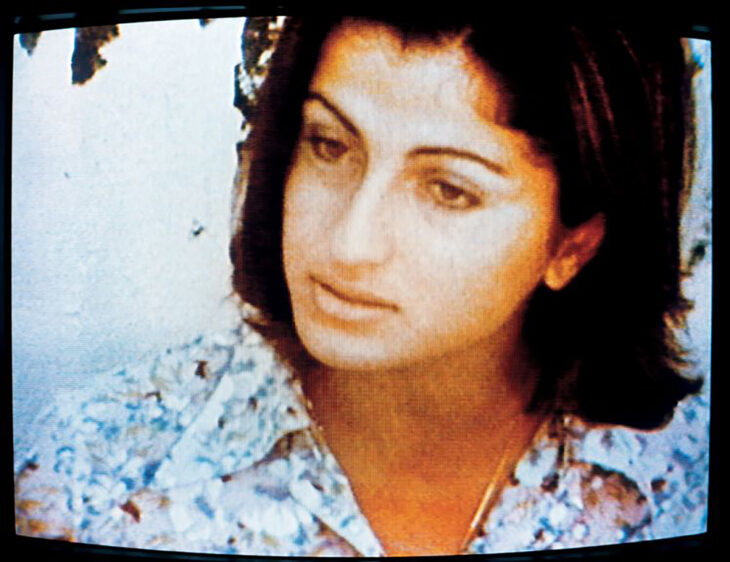
Argos was founded in 1989 to stimulate and promote the then still emerging Belgian audiovisual arts scene. In its early days, it mainly organised screenings in cultural centers across the country, but already started distributing videos to festivals, art institutions, and television networks internationally. It now holds the largest collections of artist films and videos in Belgium with nearly 6000 works. But Argos is more than just an organisation managing collections and a distribution catalogue. Since the organisation moved into an industrial building in the historic ‘Les Quais’ district of downtown Brussels (in 1999), Argos has gradually developed other activities: exhibitions, screenings, festivals, workshops, seminars, and conversations. The building currently houses a library, two exhibition spaces, a projection room, a library, a climate-controlled archive, an editing suite, offices, a café, and a bookshop.
However, the many and complex challenges that the cultural sector has been facing in recent years have prompted the Argos team to take a moment to reflect on its future. Economic constraints, technological developments, changing practices, societal issues – the reasons that are behind the fast-changing environment in which we operate are multiple and varied. Therefore, The team has decided to launch a complete overhaul of its activities and reassess its missions. This is being done while also reflecting on the organisation’s heritage and its position in today’s audiovisual and, more broadly, artistic landscape. This means rethinking our internal organisation as well as looking with fresh eyes at the content of our collections and our archive, and devising new ways of circulating the works that we have in distribution. We wanted this period of reflection to be rich and engaging and to this end, we have also involved some partner organisations, researchers, artists and other practitioners. The programme presented here has been designed to mirror the reflections running through the organisation at the moment. We will start with a compilation that we have provocatively entitled Culture is Our Business (a riveting title borrowed from Marshall McLuhan). Starting with a medium-length film that will show you Brussels from new angles, the selected films tackle, either seriously or ironically, issues ranging from how to occupy a space to the role of cultural and artistic institutions in society. And because this period of reflection has led us to delve deep into our archives, we are delighted to show you one of the first films by Johan Grimonprez (author of the film Soundtrack for a coup d’état, currently touring festivals), D-i-a-l History, a thought-provoking movie, brilliantly constructed from a great range of archival footage and remarkably relevant to the current geopolitical situation.
Katia Rossini
Sunday, 27 October 2024, 7 pm
PROGRAMME 1
Culture is our business
Curator: Katia Rossini
An art institution that wants to ensure its well-being should regularly perform a small check-up and ask itself questions about the relevance of its activities, its place in its immediate environment and who its audience is. Another fundamental question is certainly about the place of art in our society. The videos presented in this programme tackle, either seriously, ironically or critically, these issues. Starting with a film by the well-known Belgian photographer Marie-Françoise Plissart that will show you Brussels from new perspectives, the short videos that follow deal with the question of where artistic activities take place and the meaning that artists give to their artistic practice. We end with a short film by Jef Cornelis that presents the book Culture Is Our Business by Marshall McLuhan.

Belgium, 2002, DCP, shot on DVCAM, 4:3, colour, 27’45”, no dialogue
No one ever built the city to be seen from above. What can you tell from up there? The city contains everything. You can film it indefinitely, it contains all the emotions. The infinitely large and the infinitely small. The city seen from the rooftops is also an involuntary art treatise.

Belgium, 2015, DCP, 16:9, colour, 11’44”, English subtitles
An attempt at thinking the exhibition space in earlier and contemporary times. A drawing and thinking that are superimposing themselves and that blur the view of the spectator. We travel in the movie through different space and time transitions. We realise that the act of listing does not define transition(s), it is the act of moving that does.
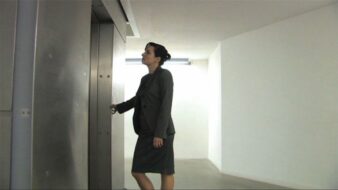
Belgium, 2009, digital file, 16:9, colour, 16’, Slovene subtitles
In the background technicians are installing a prestigious exhibition,whilst a smartly dressed lady is guiding a group of people around a series of pristine white spaces, some of them filled with crates and wrapped-up paintings. Along the way she not only comments on the art but also reveals the building to her audience from a unique perspective.

Belgium, 2002, DCP (shot on Betacam SP), 4:3, colour, 3’38”, English subtitles
In ’The Fine Arts’, Emily Vey Duke and Cooper Battersby mock their own lack of inspiration: a woman confesses that she’s speaking French in the nude because she has no good ideas but admits that her solution is unoriginal. “I hate the fine arts, I am disgusted by the fine arts, because, um, the fine arts are always made with artifice.”

Belgija, 2004, DCP (shot on miniDV), 4:3, barvni, 2’53”, Slovene subtitles
A short video, part of a serial, in which Monsieur Delmotte pretends to be a German Artist. Standing in front of a door, he holds a seemingly very serious and highbrow speech in a language that is supposed to represent German. Only here and there words like “Ausstellung, Künstles, Sheisse,…” are understandable. This work is part of the series FränZ ünd KoFöN.

Belgium, 1973, 16mm transferred to video, 4’47”, colour, English subtitles
This film is part of a series of short sketches thematic focusing on the question Wanneer is Kunst Wel Kritiek? (When is Art Criticism?). For this fourth episode, the answer – which also serves as title – is “when the artist is toying around in all seriousness”. How can it happen? ‘Many a true word is spoken in jest’ seems to tell us the Belgian artist Jef Geys (°1934). In his statement, framed as a public announcement, he uses the programme’s broadcasting time as a publicity stunt, revealing the mechanisms of the medium of television at the same time. In a lengthy word of thanks the extensive media bureaucracy is stripped of its front, mentioning the relative cost of the programme and the broadcasting time.
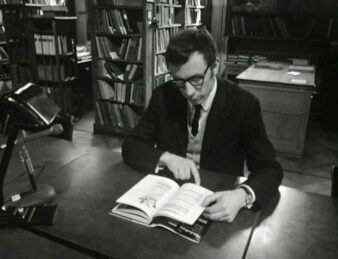
Belgium, 1971, 16mm transferred to video, 5’24”, b&w, English subtitles
In this short documentary film, Georges Adé (1936-1992), is sitting in the Antwerp municipal library, presents the book Culture is our business (1970) by the Canadian philosopher and communication theorist Marshall McLuhan (1911-1980). Adé shows reproductions of advertisements from the book and reads extracts from it. Then, while continuing talking about the book, he walks down a road filled with advertising hoardings.
Sunday, 27 October 2024, 8.30 pm
PROGRAMME 2
Dial H-I-S-T-O-R-Y
Curator: Katia Rossini
Released in 1997, Dial H-I-S-T-O-R-Y is a brilliant film-essay, a skilled montage film and an experimental documentary that traces the history of airplane hijacking. It is created from a wide range of archive images: news footage, corporate and training films, home videos, … with a voice-over featuring excerpts from the books White Noise and Mao II by Don DeLillo. Nearly thirty years later, the film is once again of the utmost relevance. In a context of geopolitical turbulence, the film reminds us how the media can irrupt in our private sphere and create anxiety and fear. (Katia Rossini)
It premiered at the Centre Pompidou in 1997, and was also part of documenta X in Kassel that same year. The film has received many international accolades and The Guardian included him in the list of 30 revolutionary works in the history of video art, from Andy Warhol to Steve McQueen. The DVD release of the film also included Slavoj Žižek’s essay A Holiday from History.
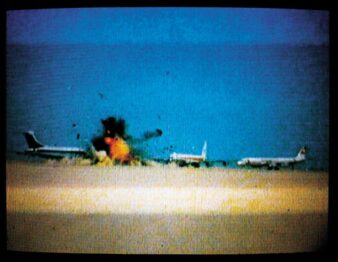
Belgium, 1997, DCP (shot on Betacam), 4:3, colour, 68′, Slovene subtitles
The guideline in Dial H-I-S-T-O-R-Y is the unofficial chronicle of world-wide aeroplane hijacking. Its blending of archival footage and personal home movie imagery sets out to investigate the media politics of our contemporary catastrophe culture. For this pseudo-documentary fully demonstrates how the spectacle of international terrorism and the desire for the ultimate disasters invade the living room to threaten our domestic bliss.
» watch the film online
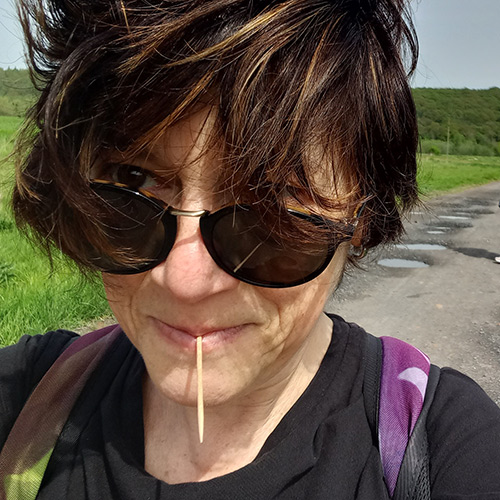 Katia Rossini likes to define herself as a film-activist, curator and archivist, interested in networks, participative projects and alternative forms of curating cinema. She is co-founder of Cinema Nova (Brussels). She is co-initiator of the networks Filmlabs.org and Kino-Climates. After completing a specialisation in Film Preservation and Restoration at UvA (Amsterdam) in partnership with Eye Filmmuseum she became head of collections at Argos – Centre for Audiovisual Arts (Brussels). (Photo: personal archive)
Katia Rossini likes to define herself as a film-activist, curator and archivist, interested in networks, participative projects and alternative forms of curating cinema. She is co-founder of Cinema Nova (Brussels). She is co-initiator of the networks Filmlabs.org and Kino-Climates. After completing a specialisation in Film Preservation and Restoration at UvA (Amsterdam) in partnership with Eye Filmmuseum she became head of collections at Argos – Centre for Audiovisual Arts (Brussels). (Photo: personal archive)
Photo: SCCA-Ljubljana archive
Production: SCCA-Ljubljana/DIVA Station
Partners: Slovenian Cinematheque, Argos
Supported by: Ministry of Culture of the Republic of Slovenia and City of Ljubljana – Department for Culture
![]()
![]()
![]()
![]()
![]()



